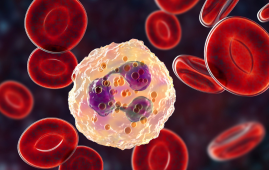

A recent study published in Scientific Reports looks at the link between dietary inflammation and coronary heart disease (CHD).
Dietary Inflammation and CHD
Smoking, drinking, and a lack of physical activity are all risk factors for cardiovascular disease (CVD). Poor diet has also been linked to the development of CVD, prompting several preventative guidelines to emphasize the importance of healthy eating habits based on evidence from randomized controlled trials (RCTs).
Chronic low-grade inflammation, which can result from overeating, a sedentary lifestyle, and age, increases the risk of CHD progressing and causing death. Low-grade inflammation stimulates atherosclerosis, plaque instability, plaque rupture, vascular remodeling, and recurrent stenosis in a dose-dependent way.
The dietary inflammatory index (DII), established at the University of South Carolina, is based on 1,943 investigations done from 1950 to 2010. DII was created by evaluating and assessing the effects of 45 dietary components on six inflammatory indicators. Currently, DII is commonly employed to investigate the relationship between inflammation and chronic disease.
About the study
The current study analyzed data from 1,303 patients who took part in the National Health and Nutrition Examination Survey (NHANES) between 2003 and 2018. Females accounted for approximately 34% of the study sample, with an average age of 67 years. The median follow-up period was 77 months.
Deaths from all causes were investigated for their relationship with the presence of pro-inflammatory items in the diet. Stratified analyses were conducted across demographic groups.
Correlations of DII and CHD mortality
Of the 1,303 patients with CHD, 536 died from a variety of causes. DII was higher in the mortality group, and a greater proportion of died study participants followed a pro-inflammatory diet.
DII was represented as both a continuous and categorical variable with values less than and larger than zero, respectively. The link between mortality and both continuous and categorical DII was examined to establish the strength of this putative association.
Higher DII raised the risk of death by 6% in the uncorrected model and 9% after controlling for age, race, and sex. After controlling for confounding variables, higher DII was linked to a 6% increase in all-cause mortality in the fully adjusted model.
With the category variable, DII less than zero was used as the reference value. Any DII greater than zero increased the chance of death by more than 50%, while the fully adjusted model showed a 41% increase in mortality risk. This connection was not linear.
Female research participants were 145% more likely to die as a result of elevated DII than controls.
Possible explanations
CHD is a chronic inflammatory illness caused by a variety of circumstances, including excessive eating and sedentary behavior. CHD can also be viewed as a symptom of systemic atherosclerosis.
The progressive constriction of blood arteries results in hypoxia, ischemia, and death of cardiac tissue. Pathological processes trigger the release of inflammatory molecules such as CRP, IL-6, IL-8, and IL-1β.
Multiple investigations have confirmed the significance of inflammation in coronary heart disease. In fact, anti-inflammatory diets high in fresh fruits and vegetables, nuts, seafood, vitamins and minerals, and fiber have been linked to a lower mortality risk among CHD patients. In contrast, the incidence of CHD is increased in persons who ingested red meat, eggs, processed meat and sugars.
Conclusions
In the current study, CHD patients who died from any reason had higher DII scores than survivors. A CHD patient’s risk of mortality from any cause was 41% higher if they followed a pro-inflammatory diet than those who consumed anti-inflammatory foods.
Previous research has found an increased risk of CHD with inflammation and higher DII scores. However, this is the first study to link dietary inflammation with all-cause death.
Given the close link between DII and CHD, dietary management of inflammation appears to be critical to secondary prevention and treatment of this illness, particularly in women. Thus, clinicians should analyze DII and educate their patients on the need of eating a sustainable, balanced, and high-quality diet to improve their quality of life.
For more information: Association between dietary inflammatory index and all-cause mortality risk in adults with coronary heart disease in the United States, Scientific Reports, doi:10.1038/s41598-024-75381-6
more recommended stories
 Microglia Neuroinflammation in Binge Drinking
Microglia Neuroinflammation in Binge DrinkingKey Takeaways (Quick Summary for HCPs).
 Durvalumab in Small Cell Lung Cancer: Survival vs Cost
Durvalumab in Small Cell Lung Cancer: Survival vs CostKey Points at a Glance Durvalumab.
 Rising Chagas Parasite Detected in Borderland Kissing Bugs
Rising Chagas Parasite Detected in Borderland Kissing BugsKey Takeaways (At a Glance) Infection.
 Can Ketogenic Diets Help PCOS? Meta-Analysis Insights
Can Ketogenic Diets Help PCOS? Meta-Analysis InsightsKey Takeaways (Quick Summary) A Clinical.
 Ancient HHV-6 Genomes Confirm Iron Age Viral Integration
Ancient HHV-6 Genomes Confirm Iron Age Viral IntegrationKey Takeaways for HCPs Scientists reconstructed.
 Fat-Regulating Enzyme Offers New Target for Obesity
Fat-Regulating Enzyme Offers New Target for ObesityKey Highlights (Quick Summary) Researchers identified.
 Gestational Diabetes Risk Identified by Blood Metabolites
Gestational Diabetes Risk Identified by Blood MetabolitesKey Takeaways (Quick Summary for Clinicians).
 Pelvic Floor Disorders: Treatable Yet Often Ignored
Pelvic Floor Disorders: Treatable Yet Often IgnoredKey Takeaways (Quick Summary) Pelvic floor.
 Circadian Control of Neutrophils in Myocardial Infarction
Circadian Control of Neutrophils in Myocardial InfarctionKey Takeaways for HCPs Neutrophil activity.
 E-Cigarette Use and Heart Attack Risk in Former Smokers
E-Cigarette Use and Heart Attack Risk in Former SmokersKey Takeaways for Clinicians and Nurses.

Leave a Comment